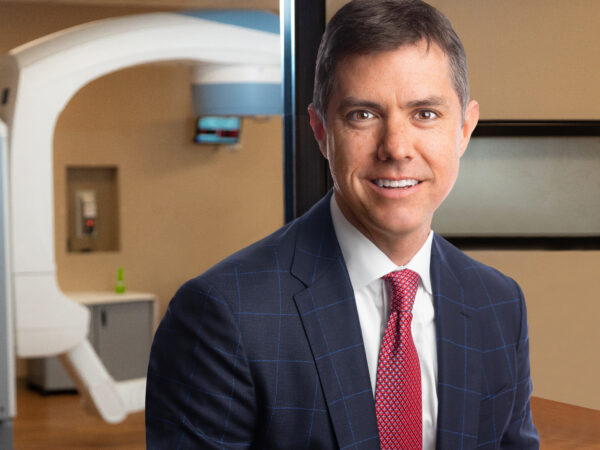Every patient’s cancer diagnosis is unique, and treatment recommendations are customized by their collaborating team of specialists to assure the possible outcome.
 About Esophageal Cancer and Radiation Therapy
About Esophageal Cancer and Radiation Therapy
Esophageal cancer is an abnormal cell growth in the esophagus, the muscular tube connecting the throat to the stomach. It’s a fairly rare cancer, accounting for about 1% of overall cancers here in Minnesota and Wisconsin. And it’s more common in men than women, for reasons that researchers are still trying to discover.
There are two types of Esophageal Cancer:
- Esophageal Adenocarcinoma (EAC): More common in the U.S. and other Western countries. It develops in the glandular cells of the esophagus, often in the lower part. It’s linked to chronic gastroesophageal reflux disease (GERD) and Barrett’s esophagus, another condition caused by acid reflux.
- Esophageal Squamous Cell Carcinoma (ESCC): Found more commonly in Africa, Asia, and parts of Eastern Europe.
Esophageal cancer can be challenging to detect at early stage because most symptoms don’t appear in the early stages of the disease. According to the American Cancer Society, these are symptoms to watch for:
- Trouble swallowing
- Chest pain
- Weight loss
- Hoarseness
- Chronic cough
- Vomiting
- Bone pain (if cancer has spread to the bone)
- Bleeding into the esophagus. This blood then passes through the digestive tract, which may turn the stool black.
The 5-year survival rate for localized esophageal cancer is about 48%, and significantly less when the cancer has spread to other parts of the body. But advanced treatment techniques including radiation therapy, chemotherapy, and immunotherapy have brightened the outlook for survivors.
Radiation therapy is a crucial component of esophageal cancer treatment.
It’s often used in combination with chemotherapy or surgery. Radiation therapy is often recommended before surgery to shrink tumors– or in some cases – even eliminate them. After surgery, radiation may be used to eliminate any residual cancer cells. Advanced esophageal cancer may include radiation therapy to relieve symptoms through palliative care.
Minneapolis Radiation Oncology uses state-of-the-art radiation technology including Intensity-Modulated Radiation Therapy (IMRT) and other advanced techniques. IMRT allows for the shaping of radiation beams to conform precisely to the tumor’s shape, reducing the dose delivered to surrounding organs such as the heart and the lungs. This is especially important for esophageal cancer patients since these organs are in close proximity to the treatment area.
What to expect at your first MRO visit.
Radiation therapy for esophageal cancer requires the utmost precision, so the care team at MRO will start with a simulation using a CT scanner. Using image mapping as a guide, your care team will position you as you would be for treatment and take measurements to build a targeted treatment plan to pinpoint the radiation –right down to the millimeter – for the best possible outcome. You’ll also meet with your MRO care team each week to monitor progress and answer any questions you may have. Since most radiation treatment plans are usually 5 days a week for 3-5 weeks, MRO has 11 locations throughout the Twin Cities, Brainerd, and Western Wisconsin to make your treatment as convenient as possible.
Like any cancer treatment, radiation therapy carries a risk for side effects.
Some common examples are:
- Esophagitis, painful swallowing, nausea, and vomiting. Pain medications and dietary adjustments, such as soft bland foods, can help. Nausea and vomiting can be controlled with anti-nausea medications and small frequent meals. Talk to your care team about strategies and options for a referral to a Dietician.
- Fatigue is best managed by conserving your energy. Get plenty of rest and do some gentle exercise. Go easy on yourself.
- Skin irritation can be treated with gentle skincare, loose clothing, and protective layers from the sun or other sources of UV rays. Ask your MRO care team before using any soaps, lotions, or other items.
Treatment of esophageal cancer often involves multiple types of treatment besides radiation, including chemotherapy and immunotherapy. Since 1982, MRO’s multidisciplinary approach ensures that you receive effective and coordinated care for the best possible outcome.
How to live with esophageal cancer.
All cancers are life-altering. With esophageal cancer and treatment, you’ll not only experience changes in body and mind, but changes to your diet and your daily routine. Ongoing care may mean you will need additional procedures.
This is the time when family and friends become most important. There are support groups for cancer patients, in-person and online. Don’t be afraid to reach out. Focus on those things which are most precious to you.
Every day, there are physicians, chemists, engineers, and other researchers going to work around the world to find faster and more efficient ways to fight cancer.


